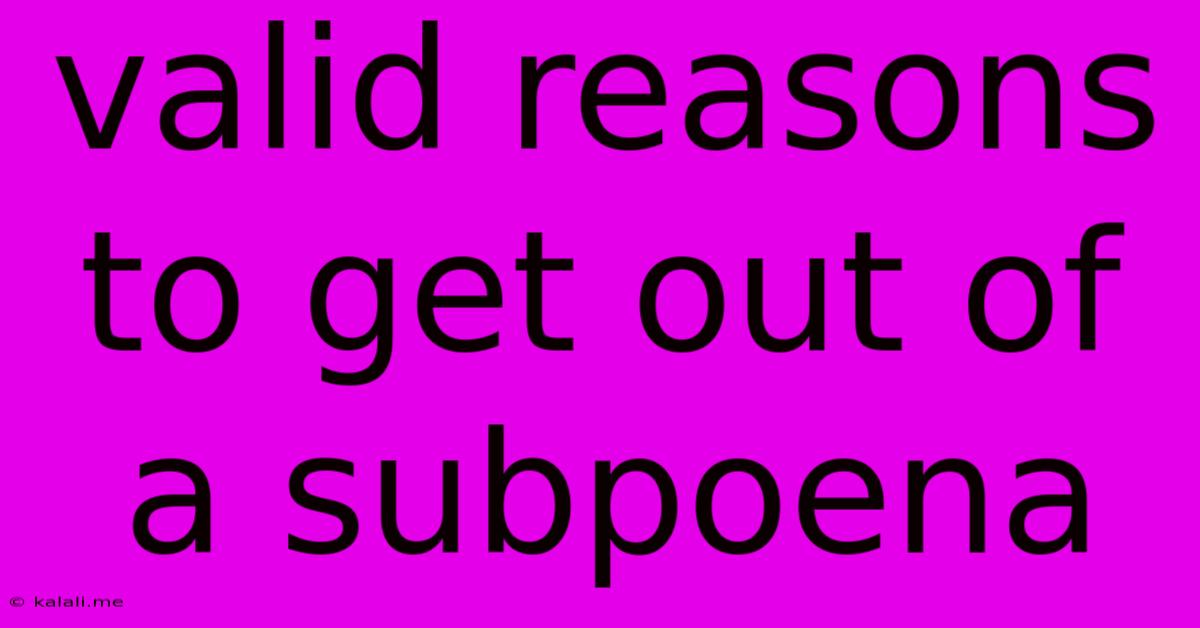Valid Reasons To Get Out Of A Subpoena
Kalali
Jun 09, 2025 · 3 min read

Table of Contents
Valid Reasons to Get Out of a Subpoena: A Guide for Individuals and Businesses
Receiving a subpoena can be a daunting experience, leaving you feeling overwhelmed and unsure of how to proceed. A subpoena is a legal order compelling you to appear in court or provide specific documents. While complying is often necessary, there are valid reasons to challenge a subpoena and potentially avoid appearing. This article explores legitimate grounds for quashing or modifying a subpoena, emphasizing the importance of seeking legal counsel immediately upon receiving one. Understanding your rights and potential defenses is crucial to protecting yourself.
What is a Subpoena? A subpoena is a legal document that commands an individual or entity to appear in court to testify or to produce documents or other evidence. Failure to comply can lead to serious consequences, including fines and even imprisonment. Therefore, navigating this process correctly is paramount.
Grounds for Challenging a Subpoena: There are several legitimate reasons to challenge the validity of a subpoena, ranging from procedural issues to substantive objections related to the requested information. These include:
1. Lack of Jurisdiction:
- The court issuing the subpoena lacks the authority to compel your appearance or the production of documents. This often arises in cases involving interstate or international jurisdictional disputes. The subpoena must be issued by a court with proper authority over you and the subject matter of the case.
2. Improper Service of Process:
- The subpoena was not properly served upon you according to the rules of civil procedure. This means the delivery method was incorrect, or it didn't adhere to the legal requirements for proper service. A defective service can invalidate the subpoena.
3. Overbroad or Unreasonable Request:
- The subpoena demands excessively broad or irrelevant information or documents. The court may quash or modify the subpoena if the request is unduly burdensome or intrusive, not reasonably calculated to lead to the discovery of admissible evidence, or seeks privileged information. This includes unreasonable demands for excessive amounts of documentation or unreasonable time constraints.
4. Privilege:
- The subpoena seeks information protected by a legally recognized privilege, such as attorney-client privilege, doctor-patient privilege, spousal privilege, or other applicable privileges. These privileges protect confidential communications and relationships from disclosure. Asserting privilege requires careful consideration and should be done with the guidance of legal counsel.
5. Relevance and Materiality:
- The requested information is not relevant or material to the subject matter of the lawsuit. The court will consider whether the information sought is reasonably calculated to lead to the discovery of admissible evidence. If the information is irrelevant, the subpoena can be challenged.
6. Undue Burden or Expense:
- Complying with the subpoena would impose an undue burden or expense on you. This could include the cost of retrieving, reviewing, and producing large volumes of documents, or the significant time commitment required. The court will weigh the burden against the need for the information.
7. Improper Purpose:
- The subpoena appears to have been issued for an improper purpose, such as harassment or intimidation. The court will examine the intent behind the subpoena and can reject it if improper motives are evident.
Seeking Legal Counsel is Essential: Successfully challenging a subpoena requires a deep understanding of legal procedure and relevant case law. Navigating the complexities of legal challenges to subpoenas is best handled by an experienced attorney. Attempting to handle this independently can jeopardize your legal position.
Conclusion: While subpoenas are a common part of the legal process, understanding the valid grounds for challenging them is vital. By seeking immediate legal counsel upon receiving a subpoena, you can protect your rights and ensure a fair and just resolution. Remember, the information provided here is for educational purposes and does not constitute legal advice. Consult with an attorney to discuss your specific circumstances.
Latest Posts
Latest Posts
-
Was Brigham Young Stabbed By One Of His Sons
Jul 01, 2025
-
How Much Does 2 Liters Of Water Weigh
Jul 01, 2025
-
If I Was Born In 1985 How Old Am I
Jul 01, 2025
-
How Many Quarters Are In An Ounce
Jul 01, 2025
-
How Many Times Does 11 Go Into 40
Jul 01, 2025
Related Post
Thank you for visiting our website which covers about Valid Reasons To Get Out Of A Subpoena . We hope the information provided has been useful to you. Feel free to contact us if you have any questions or need further assistance. See you next time and don't miss to bookmark.